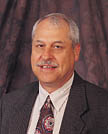

With more than 100 educational sessions to choose from over three days, you had to be dead not to learn something new. What follows are snippets of information, ideas and insight I picked up in various sessions.
- Dazzled By Technology. As a frequent car rental customer, I've been dazzled the last several years by how seamless the process has become. Especially helpful are the wireless data systems used by attendants to complete the transaction upon return, when the renter is often rushed to catch a flight.
Similar systems are used in progressive distributor warehouses to record shipping and receiving, simultaneously updating inventory and billing. These systems not only reduce costs, they improve customer service.
Aside from cost, wholesalers tend to shy away from such modern technology because they're too busy putting out day-to-day fires to implement complicated systems. They'd better find time. Adopting high technology is not an option in distribution. Companies that resist will be goners before long, in my opinion.
- Productivity Gains. According to consultant Frank Lynn, wholesalers have realized the greatest gains from computer technology of any sector of the economy. He said logistics costs have been reduced from around 30% to 20% of GNP between 1980-1995. "The logistics system is so efficient today, a distributor with six regional warehouses can deliver overnight to about 80% of the country," said Lynn.
- Back To Earth. By all means hop on the high-tech bandwagon, but not to the exclusion of common sense. A lady in one of the roundtable sessions complained that her employees were so beholden to their computers, "It's hard to get them to think outside the box. If a customer calls for a part and the system's down, the tendency is to say they can't help them, rather than go into the warehouse to check the shelves."
- Capacity Underutilization. Prophet 21 President and CEO Chuck Boyle told the audience at the opening general session that the industry average for system utilization was around 35%. At first I took that as a negative. Then I remembered reading somewhere that the average person uses only about 10% of his brain's capacity.
- A Plug For Trade Associations. The Summit included a session on Association Networking, in which ASA's Inge Calderon and some other trade association heads talked about the advantages of belonging. I thought it an unusual program to have at such an event. P-21 Executive Vice President Doug Levin explained, "Everywhere we go, in every industry we cover, we see that distributors who belong to trade associations run better businesses than those that don't. We'd like to encourage our users who are not members to join."
-
Why Electronic Catalogs? According to Frank Lynn, it costs a manufacturer or distributor about $150 to make a change in a catalog. It costs next to nothing to do so electronically.
- Distributor Provincialism. Lynn and several other speakers at the Summit addressed the reluctance of distributors to share point-of-sale information with their vendors. They fear "stealing my customers." The result is a large and unnecessary increase in manufacturer sales and marketing costs. Some manufacturers are starting to pay for that data - part of a trend toward fee-based pricing rather than traditional discounts.
- Death By Dead Stock. P-21's software has various ways of identifying and helping to move dead stock. It's a high priority with them. Doug Levin estimates items that have not moved within a year comprise between 15% and 50% of a typical distributor's inventory value. With carrying costs of between 30-35% a year, this means each $1,000 of dead inventory is costing $300-350 a year. This, as much as anything else, explains why profits are so hard to come by in distribution.
- Piling On. What's worse than owning a bunch of dead stock? Buying more of it!
P-21 software includes a feature able to identify items that haven't sold in the last 12 months, yet which were bought in the last six months. According to Levin, data shows this to be quite common among distributors. It happens because wholesalers scramble to meet minimum order quantities, and because many don't have the slightest idea what lurks on their shelves.
- S -l -o -w -P -a -y -K -i-l -l -s -T -o -o. Doug Levin conducted another program on accounts receivable days (ARD) in which he crunched some numbers to stunning effect.
Using the example of a $10 million distributor with 2% net profit before taxes, he showed how 2% profit results in $200,000 with an average ARD of 45, which is close to the PHCP industry average. Cutting it to 30 days results in $250,000 in profit, a gain of $50,000. Increasing ARD to 60 days cuts the wholesaler's take to $150,000, while an ARD of 90 would result in merely $50,000 to the bottom line, all else being equal.
That latter figure is probably overly optimistic. The longer ARD grows, the more difficult it becomes to collect the money. A group discussion in this session found some wholesalers factoring ARD into their sales commission structure. Some debit commissions if ARD goes beyond a certain point with accounts. One told of his salesmen not getting paid at all for sales going beyond 90 days ARD.
- Marksisms. Nobody tells it like it is better than Indian River Consulting's Michael Marks. Here are a couple of nuggets of wisdom coming out of his sessions at the P-21 Summit.
"The dumbest thing people do when they start a reduction in force is start at the bottom of the pyramid. Start at the top. Fire a vice president first, then start on the sales force."
"The key to profitability and customer service is inventory integrity. Items shown on your computer must actually be in the warehouse. You will never have inventory integrity as long as you allow your field sales force in your warehouse."
- A Closing Stock Tip. "Main Street will do better than Wall Street over the next decade," said Long Island stockbroker Evan Greenberg of Raymond James Financial Services.
